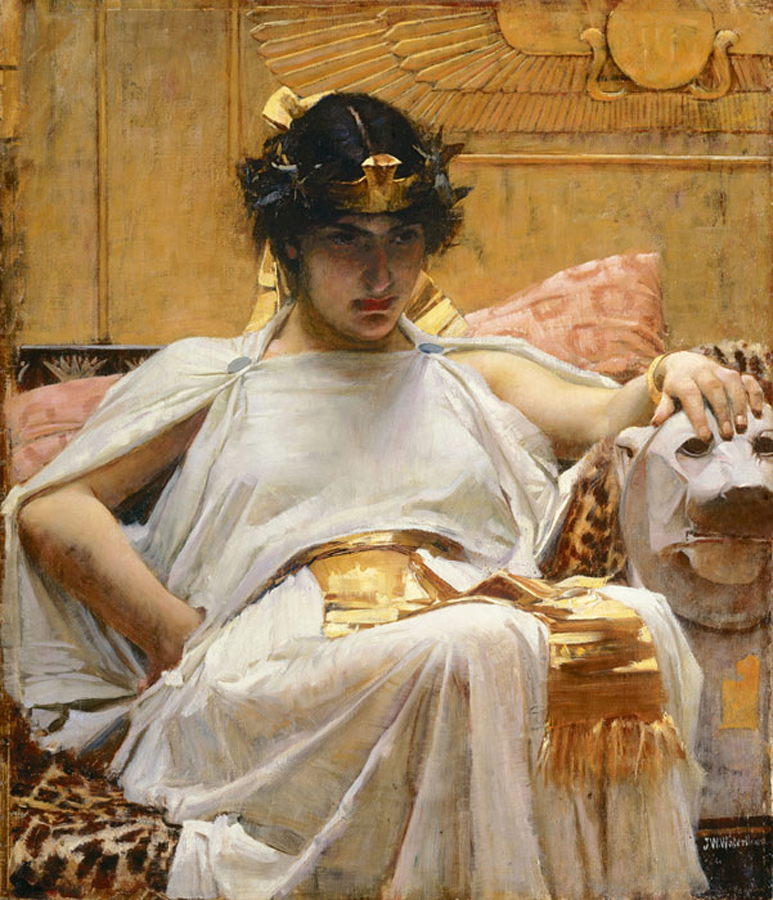Previously on Death of Antony and Cleopatra. And now Henry George Liddell.
Time: August 30 BC
Place: Alexandria, Egypt
After his defeat Antony felt it impossible to maintain the siege of Mutina. With Dec. Brutus in the town behind him, and the victorious legions of Octavius before him, his position was critical. He therefore prepared to retreat, and effected this purpose like a good soldier. His destination was the province of Narbonnese Gaul, where Lepidus had assumed the government and had promised him support. But the senate also had hopes in the same quarter. L. Munatius Plancus commanded in Northern Gaul, and C. Asinius Pollio in Southern Spain. Sext Pompeius had made good his ground in the latter country, and had almost expelled Pollio from Baetica. Plancus and Pollio, both friends and favorites of Caesar, had as yet declared neither for Antony nor Octavius. If they would declare for the senate, Lepidus, a feeble and fickle man, might desert Antony; or if Octavius would join with Dec. Brutus, and pursue him, Antony might not be able to escape from Italy at all. But these political combinations failed. Plancus and Pollio stood aloof, waiting for the course of events. Dec. Brutus was not strong enough to pursue Antony by himself, and Octavius was unwilling, perhaps unable, to unite the veterans of Caesar with troops commanded by one of Caesar's murderers. And so it happened that Antony effected his retreat across the Alps, but not without extreme hardships, which he bore in common with the meanest soldier. It was at such times that his good qualities always showed themselves, and his gallant endurance of misery endeared him to every man under his command. On his arrival in Narbonnese Gaul he met Lepidus at Forum Julii (Frejus), and here the two commanders agreed on a plan of operations.
 |
| Cleopatra by John William Waterhouse, 1888.
Public domain image from Wikipedia.
|
A curiate law passed, by which Octavius was adopted into the patrician gens of the Julii, and was put into legal possession of the name which he had already assumed--C. Julius Caesar Octavianus. We shall henceforth call him Octavian.
The change in his policy was soon indicated by a law in which he formally separated himself from the senate. Pedius brought it forward. By its provisions all Caesar's murderers were summoned to take their trial. Of course none of them appeared and they were condemned by default. By the end of September Octavian was again in Cisalpine Gaul and in close negotiation with Antony and Lepidus. The fruits of his conduct soon appeared. Plancus and Pollio declared against Caesar's murderers. Dec. Brutus, deserted by his soldiery, attempted to escape into Macedonia through Illyricum; but he was overtaken near Aquileia and slain by order of Antony.
Italy and Gaul being now clear of the senatorial party, Lepidus, as mediator, arranged a meeting between Octavian and Antony, upon an island in a small river near Bononia (Bologna). Here the three potentates agreed that they should assume a joint and coordinate authority, under the name of "Triumvirs for settling the affairs of the Commonwealth." Antony was to have the two Gauls, except the Narbonnese district, which, with Spain, was assigned to Lepidus; Octavian received Sicily, Sardinia, and Africa. Italy was for the present to be left to the consuls of the year, and for the ensuing year Lepidus, with Plancus, received promise of this high office. In return, Lepidus gave up his military force, while Octavian and Antony, each at the head of ten legions, prepared to conquer the Eastern part of the empire, which could not yet be divided like the Western provinces, because it was in possession of Brutus and Cassius.
But before they began war, the triumvirs agreed to follow the example set by Sylla--to extirpate their opponents by a proscription, and to raise money by confiscation. They framed a list of all men's names whose death could be regarded as advantageous to any of the three, and on this list each in turn pricked a name. Antony had made many personal enemies by his proceedings at Rome, and was at no loss for victims. Octavian had few direct enemies; but the boy-despot discerned with precocious sagacity those who were likely to impede his ambitious projects, and chose his victims with little hesitation. Lepidus would not be left behind in the bloody work. The author of the Philippics was one of Antony's first victims; Octavian gave him up, and took as an equivalent for his late friend the life of L. Caesar, uncle of Antony. Lepidus surrendered his brother Paullus for some similar favor. So the work went on. Not fewer than three hundred senators and two thousand knights were on the list. Q. Pedius, an honest and upright man, died in his consulship, overcome by vexation and shame at being implicated in these transactions.
[Footnote 2: Pedius was son of Caesar's second sister, Julia minor, and therefore first cousin (once removed) to Octavius.]
Continued on Wednesday, March 25th.
More information on Marc Antony from History.com, on Cleopatra from The Smithsonian and National Geographic Magazines.
No comments:
Post a Comment